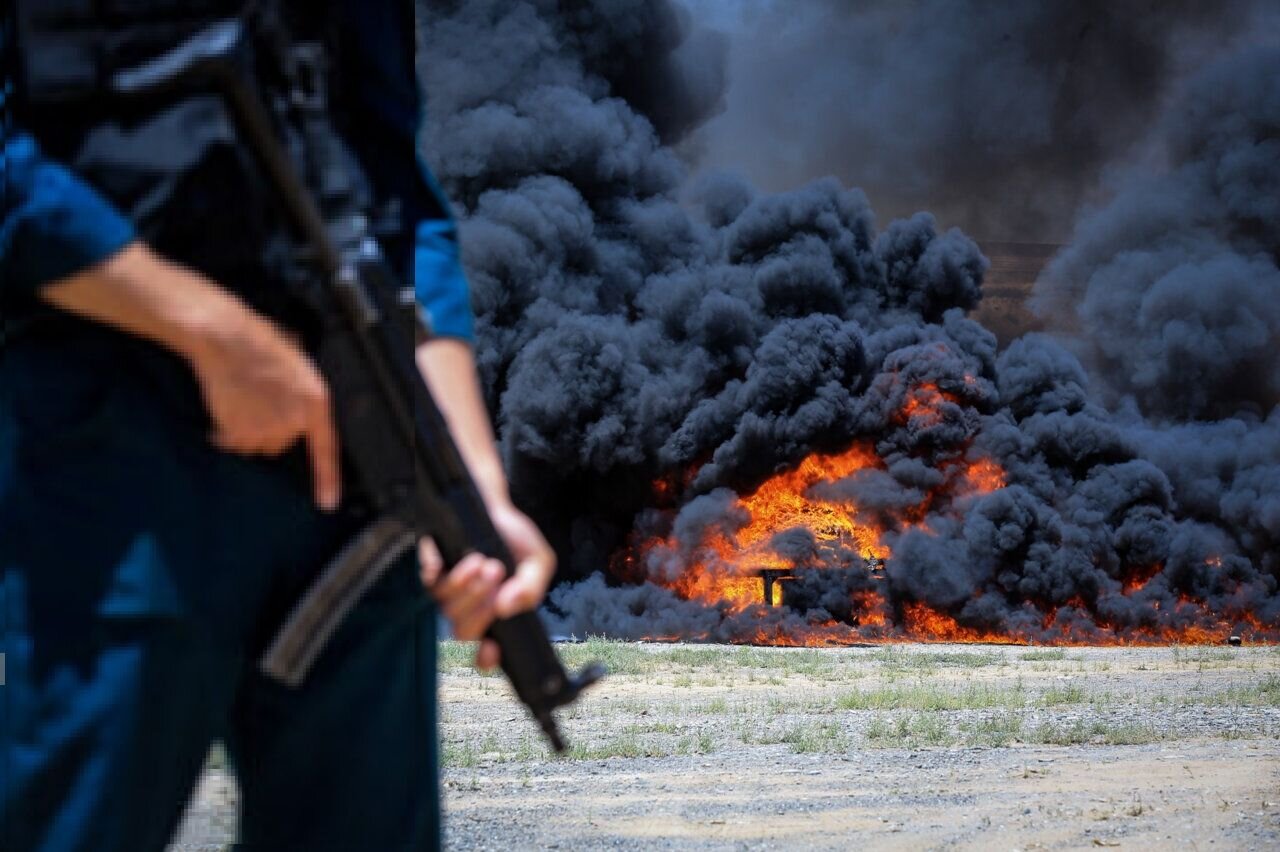Police dismantle drug trafficking gang in southeast

TEHRAN – The anti-narcotics police have disbanded a drug trafficking gang in Saravan county, southeastern Sistan-Baluchestan province, Ahmad-Ali Goudarzi, Commander of the Border Police, has stated.
Some 735 kilograms of narcotics were discovered in the region, IRNA quoted Goudarzi as saying.
Border guards seized 465 kilograms of opium, 270 kilograms of hashish, a hand-held wireless device, a weapon, and some other items. Also, 2 smugglers were killed and a vehicle was confiscated, he added.
Being actively present in the borders, border guards will prevent illegal border crossing of foreigners and narcotics, that risk the health and life of the youth, into the country, Goudarzi highlighted.
Undeniable achievements
Given that there are over 1,180 types of narcotics in the world, Iran’s accomplishments in the battle against illicit drugs are undeniable, an official with the anti-narcotics headquarters has said.
“According to a United Nations research, like poverty, weapons of mass destruction, and environmental crises, addiction is one the most important global challenges, IRNA quoted Alireza Kazemi as saying.
The official went on to say that the country’s efforts encompass fight, prevention, and treatment which have changed the world's attitude towards Iran in the fight against narcotics.
UNODC, Japan supports Iran
The trafficking routes affect many countries in the region, including Iran.
The United Nations Office on Drugs and Crime (UNODC) has established a robust partnership with the Government of the Islamic Republic of Iran, focusing on capacity building for Iranian law enforcement agencies. UNODC provides technical assistance to Iran in its efforts to combat illicit drug trafficking and the smuggling of precursor chemicals.
As part of these efforts, trained drug-detecting dogs will be deployed at border crossings and checkpoints with Afghanistan to conduct searches on trucks, containers, and cargo, passing through legal entry points, the UN website announced in a press release on August 1.
UNODC Iran, also provided training sessions for the Iranian ANP canine trainers, trained by international senior instructors, to use their knowledge during their daily work at border crossings to search vehicles, containers, and cargo.
The event was organized as part of the activities outlined in the framework of Sub-Programme1, specifically focusing on “Border Management and Illicit Trafficking”. This initiative is supported through generous funds, provided by the Government of Japan.
Alexander Fedulov, UNODC Country Representative in Iran, acknowledged the significant achievements of the Iranian Anti-Narcotics Police and their drug-detecting dog center. He expressed readiness to offer further technical and procurement support upon the availability of financial support from the donor countries.
In July, the UNODC in the Islamic Republic of Iran handed over 4 drug identification devices procured through generous support by the Japanese Government, in an official ceremony at the premises of the Drug Control Headquarters (DCHQ) in Tehran.
These devices which will be used for controlling a wide range of drugs trafficked, especially at the eastern borders of Iran with Afghanistan, have been procured under sub-program 1 of the UNODC Country Partnership Program (CPP) 2023-2026.
This official event was organized at the Drug Control Headquarters in Tehran, with the presence of Tamaki Tsukada, Ambassador of Japan in Iran, as the representative of the Government of Japan.
Iran on the frontline
Iran has been the only country on the front line of the war against narcotics for over 45 years despite oppressive sanctions of the U.S., the economic problems ahead, and the limited contribution of other countries.
With 4,000 martyrs in the fight against drugs, Iran is now self-sufficient in preventing addictions and has changed the balance of power in favor of the youth in the region, IRNA reported.
Their sacrifice has not only safeguarded the borders of the country but also the countries that claim democracy and human rights.
According to the United Nations Office on Drug and Crime (UNODC), about 35-40 percent of the drugs produced in Afghanistan are smuggled through Iran to enter Europe and west of Asia.
However, with the bravery and perseverance of anti-narcotics police, more than 75 percent of the drugs are discovered and destroyed.
If it weren't for necessary actions taken by Iran, this amount of illicit drugs would have caused disasters in European and American countries.
Logistical, equipment, and financial sanctions under the pretext of political sanctions, in practice, have left Iran alone in dealing with the world's largest drug trafficking axis.
According to official reports, Western countries have so far withheld even the slightest aid to Iran.
"The increase in sanctions has also cast a shadow on the fight against narcotics, but we warn them that sanctions on narcotics are the most unintelligent sanctions since it will lead to a decrease in world security,” IRNA quoted Iran's Police Chief, Brigadier General Ahmad Reza Radan as saying.
Relying on the expertise of Iranian elites and researchers, as well as using up-to-date equipment and modern inventions of knowledge-based companies, the anti-narcotics police has been able to achieve good results in drug discoveries and arresting drug dealers.
Considering that drug-related crimes are considered transnational organized crimes, no single country can effectively tackle the fight against drugs alone.
On April 17, Alireza Kazemi, an official with anti-narcotics headquarters, said, “Iran is now self-sufficient in preventing addiction, treating addicts, and combating narcotics.”
Despite unfair sanctions, knowledge-based companies have achieved significant scientific progress in dealing with the harms of addiction and drugs which has made the country independent from foreign aid.
Domestically-made products that are used to treat drug addiction can be exported to other countries, even advanced countries, he added.
The affordability and the minimal side effects of these products have made them competitive compared to foreign counterparts. In some cases, they have proved to be even much more effective.
MT/MG
